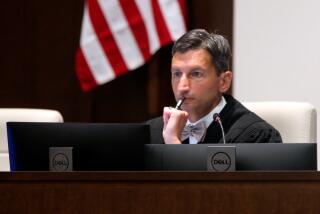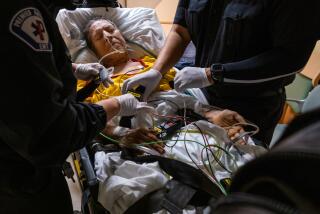Judge Directs Kidney Patient to Find Treatment Elsewhere : Continue Dialysis Another Week, Doctor Told
SANTA BARBARA — A judge here Friday ordered a kidney specialist to continue administering life-sustaining dialysis treatment for one more week to an Ojai woman whom he was going to drop and other area doctors have refused to treat.
But, in granting a temporary restraining order until Friday, the judge ruled that Jeanie Joshua will then have to find dialysis treatment elsewhere, even if it means commuting 80 miles to Los Angeles three times a week.
“This is going to be a slow death,” said the frail 87-pound Joshua, who now has a friend drive her 40 miles to Santa Barbara’s Cottage Hospital. “There’s no way I can withstand it.”
Joshua, a 38-year-old former gym teacher, claims that kidney specialists from Santa Barbara to Simi Valley have refused to treat her because of a malpractice suit she filed two years ago.
Her current physician, Dr. David W. Doner Jr., had told her last month that he was going to drop her as a patient effective Friday because he could not find another kidney specialist willing to see her if he should need to leave town.
“Jeanie has been locked out,” said her husband, Sholom, a Ventura County children’s services social worker.
An attorney representing Doner, however, said that the kidney specialist was merely exercising his right not to treat a patient whom he considered burdensome.
‘May Select Patients’
“It’s well established law that a physician may select which patients he cares for,” said Harold M. Haider, the lawyer representing Doner.
Doner, in an earlier interview, contended that Joshua had become overly aggressive about directing her own medical care and, because no other physician was willing to be on call to back him up, said she also curtailed his ability to spend time outside of Santa Barbara for either personal or professional activities.
In the few such cases that have been decided by the courts, judges have generally upheld the right of physicians, for any reason, to sever a relationship with a patient or not to accept a person as a new patient, said Arthur Caplan, director of the Center for Biomedical Ethics at the University of Minnesota.
But, he said, provisions have usually been made so that even the most abusive and combative patients have access to life-sustaining treatment, either on a rotating basis among clinics or at a public hospital.
“There are cases where patients have been dialyzed while shackled to a bed or with an armed guard present,” Caplan said. “You can’t just be abandoned in a life-and-death situation.”
Even so, Joshua said that she is not a disruptive patient, but rather an assertive, questioning person who merely demands an explanation of all alternatives and sometimes refuses to submit to tests or treatments she considers needless.
Points to 1986 Lawsuit
She maintains that the root of the problem lies in the 1986 lawsuit she filed against another Santa Barbara kidney specialist for allegedly using impure water in her dialysis machine. That suit is pending in Ventura County Superior Court.
Three medical groups representing a total of 11 doctors in southern Santa Barbara and Ventura counties have refused to see her, Joshua contends. Doner, in a letter to her, indicated that he contacted six local specialists without luck.
One solution proposed by Doner and advocated by the judge was for Joshua to receive treatment at the UCLA Medical Center, which has agreed to accept her as a dialysis patient. But Joshua, who rarely drives because of her illness, said the thrice-weekly commute would be impossible in her weakened condition.
Dr. Allen Nissenson, director of UCLA’s dialysis program, said that, while it seemed foolish for Joshua to pass by other clinics on her way to the university, such lengthy commutes are not unusual for kidney patients in rural areas.
“Although it’s unfortunate . . . that’s life,” he said in an earlier interview.
More to Read
Sign up for Essential California
The most important California stories and recommendations in your inbox every morning.
You may occasionally receive promotional content from the Los Angeles Times.










